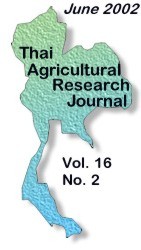ThaiScience
ThaiScience
THAI AGRICULTURAL RESEARCH JOURNAL
Volume 37, No. 02, Month MAY, Year 2019, Pages 112 - 127
Biology, mass rearing, efficiency and effects of pesticides on anthocorid predator, cardiastethus exiguus poppius (hemiptera anthocoridae)
Athitiya Kaewpradit, Pichate Choawattanawong, Ploychompoo Kornvipartreang, Atcharabhorn Prasoetphon, Naphacharakorn Ta-Phaisach, Wimolwan Chotwong
Abstract Download PDF
Cardiastethus exiguus Poppius (Hemiptera: Anthocoridae) is a beneficial anthocorid predator. It was first ecorded in Thailand in 2013 but very little information is available This research, aims at studying the life cycle and biological attributes, effect of food resources, egg-laying substrates and temperature suitable for mass rearing, including predatorial efficiency to control insect and mite pests and effects of some pesticides on C. exiguus. The experiments were carried out from October 2013 - September 2018 at Plant Protection Research and Development Office, Department of Agriculture. The Biology of this predator was studied using rice moth egg (Corcyra cephalonica) as food. The results revealed that exiguus had three stages with the average egg, nymphal, and adult periods of 4.18, 17.72,and 49.13 days, respectively. It grew better when fed with rice moth eggs as indicated by the net reproductive rate of increase (Ro) which was 11.88 compared to 0.790 when reared with cattail pollens. The most suitable egg laying material was paper towel with the highest number of eggs laid at 130 eggs per life expectancy. Paper towel also yielded the highest number of egg hatching at 91.47% which was significantly higher (P <0.05) than other materials. The optimum temperature for mass rearing was 27± 1ºoC of which the average of 114 eggs with 89.68% hatching were obtained from individual bug. The biological life tables were examined by feeding on four pest species, namely Thrips palmi, Phenacoccus manihoti, Tetranychus truncatus and Polyphagotarsonemus latus. The net reproductive rate (Ro) when feeding on these preys was 5.89, 5.60, 2.9 3 and 0.0, respectively. The female adult could feed up to 348.52 T. palmi in its life cycle. Under greenhouse conditions, adult female consumed 15.50 T. palmi per day while the 3rd nymphal stage it consumed 15.32 per day. Eight of 14 insecticides i.e. amitraz, pyridaben, spinetoram, white oil, metalaxyl, mancozeb, carbendazim and sulfur showed no effect on C. exiguus when treated by dry-film method for 7 days, In conclusion C. exiguus is a promising predator that can easily be mass reared at low cost and effectively used to control T. palmi in greenhouse condition.
Keywords
Key words: Cardiastethus exiguus, mass rearing, efficiency, side - effectsTHAI AGRICULTURAL RESEARCH JOURNAL
Published by : Department of Agriculture
Contributions welcome at : http://it.doa.go.th/
